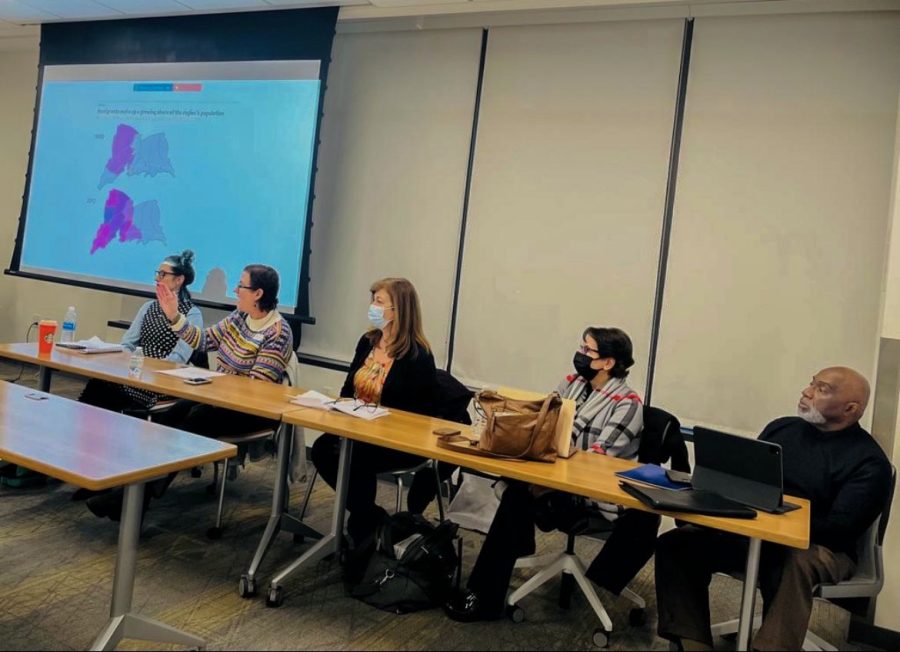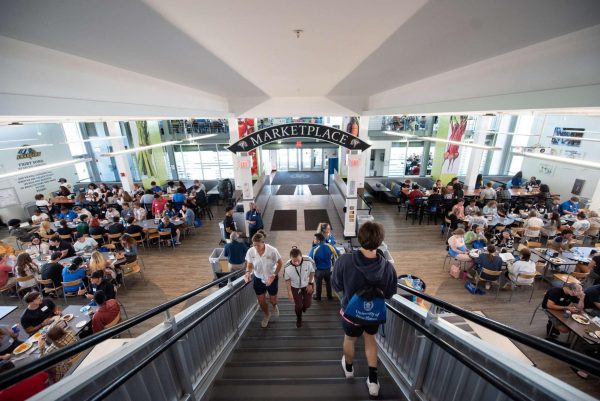The Impact of International Education on International Students discussed in Global Competency Panel
Charger Bulletin/Anchal Bhatia
The Global Competency Panel speaks during the event, West Haven, Nov. 15 2022.
As part of International Education Week this year, a panel discussion was held by Modern Languages, the Office of Graduate and International Student Life (OGISL), the Career Development Center (CDC), the College of Arts and Sciences and the University Immigration Services (UIS), on Tuesday evening at the Bergami Center for Science, Technology, and Innovation. Hosted by Jason Howell, OGISL coordinator for student engagement, the Global Competency Panel Discussion reflected detailed opinions by the five panelists including Halima Belemlih, coordinator and a distinguished lecturer of the modern languages, Jessica Sztaimberg, career advisor in the CDC, Kathy Kautz de Arango, executive director of UIS; Kei Lutalo, senior lecturer and director of the academic preparatory program of the college of arts and sciences and Daria Kirjanov-Mueller, modern languages faculty member.
Several questions about international students and international education were discussed throughout the hour-long panel discussion. Upon sharing their experiences and opinions, the panelists collectively agreed that international education is one of the best learning experiences for students keen on exploring the vast boundaries of education and life itself. After being asked about the value of international education, Sztaimberg shared her experience of being part of international education for over 17 years. She said, “Working with international and national students of different countries has taught me a lot. Besides, I have studied in several nations where I realized I learned much more than just the language and communication.”
Speaking next, Kautz de Arango listed the benefits of studying abroad, which included high collaboration, leadership, management, curricular and co-curricular learning. She further stated how studying modern languages help and contribute towards the growth measures of students from different areas, countries and races. “International education helps advance a student’s personality, well-being, and learning, and the best diplomacy happens when students from different places come together to grow and learn.”
Talking about the impact of international education, the panelists confidently opined how this move to a new place or setting helps an individual’s growth. Sharing thoughts about this topic, Kirjanov-Muellerresponded, “When students travel abroad to pursue their chosen program, they not only invest in a destination where they feel they will acquire quality education but also invest in a place where they see has more possibilities in every aspect. With so many options to choose from now, students enroll in their desired programs and learn things with a broader perspective. At the same time, explore a new destination, experience an independent lifestyle, and discover their potential more confidently.”
Agreeing with what Kirjanov-Mueller expressed, Belemlih added, “Besides the benefits, students wish to keep up with the growing competition. With globalization taking over the world, every aspirant desires to pace with the technically-enriching surrounding. Moving out from a known, comfortable lifestyle adds to the growth and learning.”
The impact and value of international education were further explained by Lutalo, who believes that studying abroad also comes with major changes for any individual. One of his examples included how students are shocked when they initially start their academic program in a new destination and are shocked to learn about the importance of practical knowledge rather than theoretical learning. He also stated, “Studying abroad helps enhance self-confidence and self-presentation. Students start comparing how they were in their native country to how they are now, accelerating their thought processes, skillset, and problem-solving abilities.”
The next segment discussed intercultural skill development and representation in personal and academic lifestyles. All five panelists stated the difficulties and challenges that international students sometimes deal with and how these challenges shape them into better individuals in the long term. They talked about uncomfortable experiences, which seem to be overwhelming at first, but add to the growth elements for any student by enhancing their strength and confidence.
All the panelists agreed that international students could genuinely build their personalities and overcome difficult settings and situations by being proactive in their present surroundings, interacting with a diverse group of individuals, and being active participants in various clubs, events and organizations. They also stated that national students should seek advantage from diverse groups, learn and share their knowledge and habits with new students.







